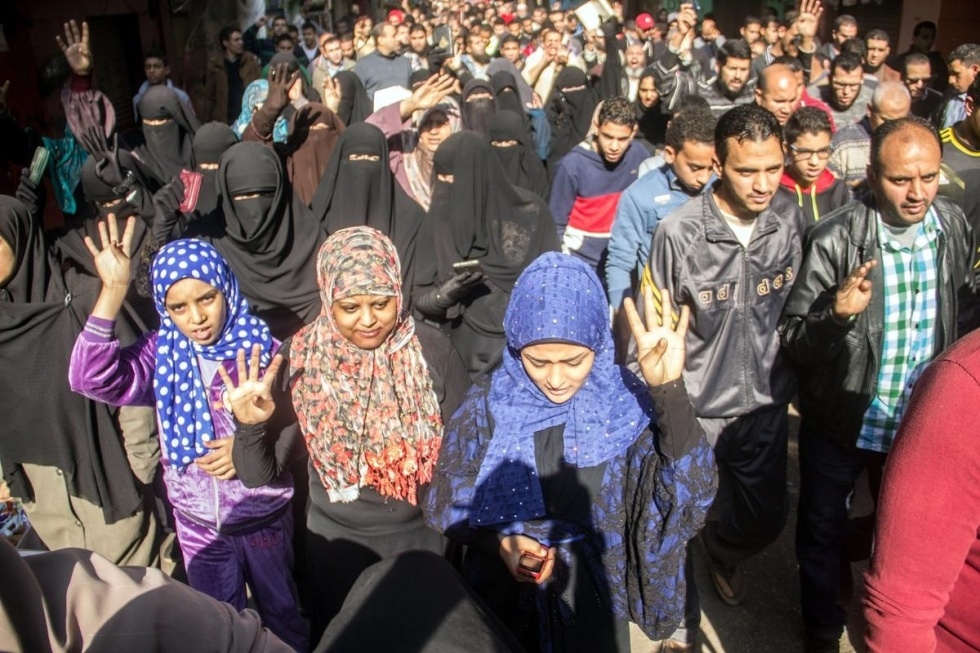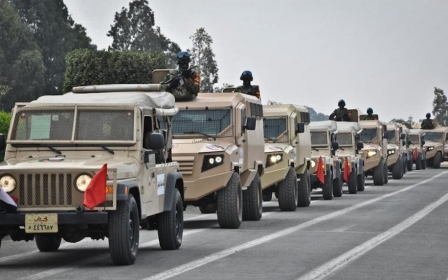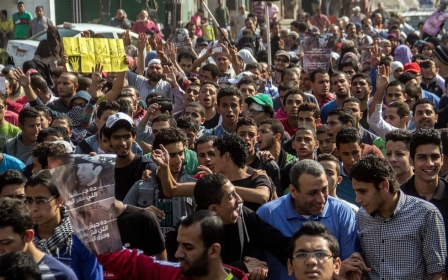3 protestors, 2 soldiers killed in day of ‘Islamist’ protest in Egypt

Protests in Egypt turned bloody on Friday with three protestors and two army officers now confirmed killed.
More than a dozen others were also injured, and almost 220 arrested nationwide – including in the run up to the protest - according to Andadolu Agency. The Interior Ministry, however, put the figure at 150 in a post on its Facebook page.
The protests, called for by the pro-Morsi National Alliance and Egypt's Salafist Front, a component of the alliance, began after Friday prayers, with hundreds of people marching in Cairo and Alexandria.
The day was somewhat quieter than expected, with heavy security rolled out across Egypt and many main squares and roads blocked off.
However, clashes broke out in Cairo’s Matariya neighbourhood, with three protestors reportedly killed, according to Anadolu Agency.
A source from the National Alliance for the Defense of Legitimacy, Morsi's main support bloc, said one of the fatalities involved a pro-Morsi protester. However, Cairo security chief Ali al-Demerdash said the man had been killed by gunfire from Muslim Brotherhood supporters while leaving a mosque following Friday prayers, and said that the police was “showing self-restraint in dealing with protesters."
Two army officers were also killed in two separate incidents in Cairo and the northern province of Qalioubiya.
According to the security services, both attacks were carried out by unknown assailants who opened fire. Several soldiers were also wounded in Qalioubiya.
Later in the day, a bomb struck an army vehicle in the restive Sinai Peninsula, injuring five.
Several other blasts were also reported across the country. An improvised explosive device (IED) went off in the Nile Delta province of Sharkiya, injuring six.
Cairo’s downtown was also hit, with a homemade bomb going off in Abdel Moneim Riad Square and a separate sound bomb detonating in the vicinity of Attaba. No injuries were reported.
A blast was also reported, but so far not confirmed, in Alexandria where various social media accounts said that the central security building in Sidi Bishr had been hit.
MEE’s contributors in Cairo said that the city was uncharacteristically quiet throughout the day, with people choosing to stay indoors and largely avoiding public transport and public squares.
“After weeks of hype in the media, downtown Cairo's streets were conspicuously quiet, while deadly clashes broke out in the north-west neighbourhood of Matareya following Friday,” journalist and MEE contributor Tom Rollins said.
“As night fell, people and traffic began to reappear, although far less than usual for a Friday.”
The protesters were calling for Morsi’s reinstatement, and an end to what they say is military rule in Egypt, with Egypt's security agencies on highest alert ahead of the march in anticipation of widespread violence.
The authorities – which have unleashed a broad crackdown on dissent, mainly targeting Morsi supporters – had threatened to use live ammunition against anyone who attacked state institutions during Friday's planned protests.
Morsi, the country's first freely elected president and a Muslim Brotherhood leader, was ousted by the army last year following mass protests against his single year in office.
President Abdel-Fattah al-Sisi, a former army general who played a key role in Morsi's ouster, was declared the winner of a controversial presidential election conducted in May. Small scale pro-government protests, attracting maybe a few dozen people, also broke out on Friday, marching to Cairo's infamous Tahrir Square, which was the epicentre of the 2011 Revolution that toppled former strongman Hosni Mubarak.
New MEE newsletter: Jerusalem Dispatch
Sign up to get the latest insights and analysis on Israel-Palestine, alongside Turkey Unpacked and other MEE newsletters
Middle East Eye delivers independent and unrivalled coverage and analysis of the Middle East, North Africa and beyond. To learn more about republishing this content and the associated fees, please fill out this form. More about MEE can be found here.



